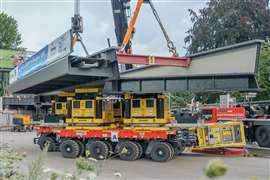What benefits do veterans bring to construction?
09 November 2023
 RCP via AdobeStock - stock.adobe.com
RCP via AdobeStock - stock.adobe.com
Veterans are an under-tapped labour pool for construction but many of the biggest-name companies know the benefits to be gained from employing this group of dedicated individuals.
Veteran’s Day is an often-misunderstood observance. For starters, it is observed not just in the US, but also in France, Australia, Canada, and Great Britain, where they call the day of honour Remembrance Day.
Always celebrated on 11 November, no matter what day of the week it falls on, Veteran’s Day is meant to celebrate and honour all veterans — deceased or living. It is not to be confused with Memorial Day, a day in May centred on remembering those service members who gave the ultimate sacrifice of their lives.
Interestingly, construction and adjacent industries employ a significant number of veterans.
According to the latest Employment Situation of Veterans report released by the US Bureau of Labor Statistics, the share of employed veterans working in the construction industry increased to 6.5% in 2022 – the second consecutive annual increase. The share has climbed 0.6 percentage points since 2020 and is just one-tenth lower than the most recent peak reached in 2019.
Several construction companies have made employment of veterans a strategic priority. They know veterans are rich pool of labour, but they also understand the societal importance of giving opportunities to the heroes who’ve given so much of themselves to serve their country.
What veterans say about working in construction
Contractor Skanska USA says it welcomes people with military backgrounds and has published a wealth of case studies of employees within its ranks who previously had military careers.
 Albert Zulps (Image: Skanska)
Albert Zulps (Image: Skanska)
Among them is Albert Zulps, director of emerging technology at Skanska, who is a former marine engineering officer in the Royal Canadian Navy.
Asked what value veterans bring to the industry, Zulps says, “Strong work ethic and support of their peers, along with a unique perspective. Every person’s military background and experience is different. For myself, travelling in the military informed me of different cultures, ways of thinking and exposure to various built environments around the world. This led to studying architecture, and exposure to the construction industry in which I currently work.”
Paul Bedford, who served in the Royal Logistics Corps for nine years and completed his service as captain in 2019, now works on the major UK high-speed rail project HS2 for contractor EKFB (a joint ventured between Eiffage, Kier, Ferrovial, and BAM Nuttall).
He was a troop commander during his service and was deployed to operations in the Middle East, before joining the construction industry via the BuildForce, which aims to place former armed services personnel into the sector.
 Image: HS2
Image: HS2
He says, “The skills you learn in the military stay with you for life. Delivering logistics support across significant distances was familiar territory for me, and it’s great that the team at EKFB are bringing in lessons learned from my military expertise to deliver efficiencies in HS2.”
Earlier this year, the Construction Briefing also interviewed former US marine Craig Knight who was an infantry sargeant in some of the most dangerous war zones on the planet before embarking on a construction career with Suffolk, where he is now an assistant superintendent.
“I think construction is a great transition for veterans,” Knight says.
“In many ways it’s similar to the military. You’ve got a common goal or objective. And even though its cold and windy and rainy, it’s a tough job but you know that the person to your left and the person to your right is suffering in the same way and I guess that brings a kind of camaraderie.”
Former US marine on how military veterans can build a construction career
Why hire veterans in construction?
Among the reasons for construction companies to consider hiring veterans are:
Veterans are adaptable and trainable: People who have worked in the armed forces are expected to learn and develop continuously as well as to be adaptable, which means they are likely to be flexible in the workplace as a veteran. Col. Dan Friend, former US Army chief of staff senior fellow at the Kellogg School of Management says, “The army is a learning organisation. You start with initial training and you constantly return to training. So we end up with a group of people who, frankly, have a growth mindset.”
Lower rates of absence, higher rates of retention: A survey by accountancy firm Deloitte of 50 employers has found that 76% said veterans had lower rates of sickness absence compared to non-veteran colleagues. Meanwhile, 40% of employers said they were more likely to stay at a company longer. They were also likely to be promoted more quickly.
Strong leadership skills: A November 2022 survey of over 12,000 people for the Office for Veterans’ Affairs in the UK found that 55% considered that former services personnel would being leadership skills to the workplace (55%), as well as problem-solving (61%) and communication skills (61%).
Pre-existing training: Many veterans already have training in a range of different technical roles including engineering, project management and operating heavy machinery that are highly transferable to construction.
Reflects well on businesses: Recruiting veterans demonstrate good social responsibility on the part of employers and helps to build goodwill with customers and employees. A survey of 100 employers by the Royal United Services Institute (RUSI) found that 74% of employers wish to publicly support the Armed Forces.
Resources for recruiting veterans
Among the resources available for recruiting veterans to construction are a number of different national programmes and jobs boards. They include:
- BuildForce (UK)
- Hiring our Heroes (US)
- Build Your Future (US)
- Helmets to Hardhats (US)
- Veterans in Construction (Australia)
STAY CONNECTED


Receive the information you need when you need it through our world-leading magazines, newsletters and daily briefings.
CONNECT WITH THE TEAM











